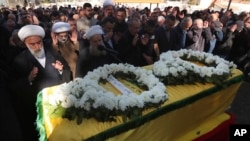Continuing retaliatory attacks and targeted assassinations along the Lebanon-Israel border are prompting warnings of an escalation that could unleash a wider conflict in the region.
Lebanon’s Iran-backed Hezbollah militia said it targeted Israel’s northern army command Mount Meron base Tuesday, its second such attack on the post in recent days. Later Tuesday, Israeli warplanes fired missiles at Lebanon’s southern districts of Bint Jbeil, Nabatieh and Iqlim al-Tuffah, destroying homes and wounding several people, Lebanon’s National News Agency reported.
The border skirmishes have forced citizens on both sides to move further inland for safety.
Lebanon’s caretaker foreign minister, Abdullah Bou Habib, in remarks to the Council on Foreign Relations in New York this week, linked the retaliatory aerial bombings to the war in Gaza.
“It is minor fighting, and I don’t think the intention is to have a big war,” he said. “It also has to do with what’s going on in Gaza — it’s not acceptable Arab-wise, it’s not acceptable world-wise.”
However, analyst Dania Koleilat Khatib points to Israel’s increasing use of targeted assassinations of Hezbollah and Hamas leaders in Lebanon, such as Wissam al-Tawil and Saleh Arouri, as potential triggers for a wider conflict with Hezbollah.
Khatib, president of the Research Center for Cooperation and Peace Building in Beirut, told VOA that Hezbollah is “poking” Israel but doesn’t want an escalation. However, she said an escalation is possible if the United States does not rein in Israeli Prime Minister Benjamin Netanyahu.
“I think the Israeli army doesn’t want to go to Lebanon because they know they cannot win,” she said. “They can destroy Beirut, but they cannot destroy Hezbollah. But I see it escalating unless there is U.S. pressure.”
Professor Filippo Dionigi of the University of Bristol in Britain told the France 24 TV network that Israel’s targeted assassinations have gone beyond the “rules of engagement.”
“The other possibility is error, is over-shooting, involving citizens to a greater [degree] than they’re already involved,” he said. “That can create unwanted consequences on both sides of the conflict and therefore open the possibility of a greater escalation and even a possibility of an all-out war.”
Other observers say that Lebanon’s dire economic crisis means there is little appetite for war with Israel and that Hezbollah would risk a significant public backlash.
Tobias Borck, a researcher at the Royal United Services Institute in London, warned in Britain’s MailOnline, as the Gaza war continues, “I think the risk of something going wrong compounds the longer this goes on.”




